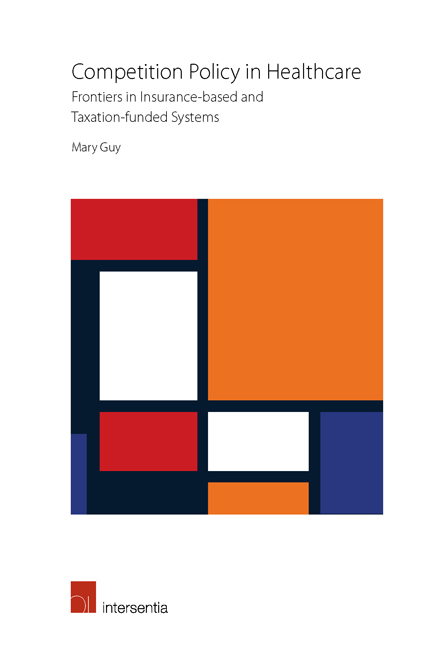Book contents
- Frontmatter
- Foreword
- Preface
- Acknowledgements
- Contents
- List of Cases
- List of Legislation
- Table of Figures
- Abbreviations
- Introduction
- Chapter 1 Competition Reforms in Dutch and English Healthcare and the Development of Competition Policy
- Chapter 2 Competition Law: Its Applicability and Application in Dutch and English Healthcare
- Chapter 3 Sectoral Regulation: The Relationship between the Competition Authority and the Healthcare Regulator in the Netherlands and England
- Chapter 4 Merger Control: Hospital Mergers, General Merger Control and the Development of ‘Healthcare-Specific’ Merger Control in the Netherlands and England
- Conclusion
- Bibliography
- Index
- About the Author
Chapter 3 - Sectoral Regulation: The Relationship between the Competition Authority and the Healthcare Regulator in the Netherlands and England
Published online by Cambridge University Press: 30 March 2019
- Frontmatter
- Foreword
- Preface
- Acknowledgements
- Contents
- List of Cases
- List of Legislation
- Table of Figures
- Abbreviations
- Introduction
- Chapter 1 Competition Reforms in Dutch and English Healthcare and the Development of Competition Policy
- Chapter 2 Competition Law: Its Applicability and Application in Dutch and English Healthcare
- Chapter 3 Sectoral Regulation: The Relationship between the Competition Authority and the Healthcare Regulator in the Netherlands and England
- Chapter 4 Merger Control: Hospital Mergers, General Merger Control and the Development of ‘Healthcare-Specific’ Merger Control in the Netherlands and England
- Conclusion
- Bibliography
- Index
- About the Author
Summary
INTRODUCTION
The development of competition in the Dutch and English healthcare systems has been accompanied by the establishment of sectoral regulators for healthcare: the Nederlandse Zorgautoriteit (Dutch Healthcare Authority (NZa)) by the Wet marktordening gezondheidszorg (Dutch Healthcare (Market Regulation) Act 2006 (Wmg)) and NHS Improvement by the Health and Social Care Act 2012 (HSCA 2012), respectively. Both the Wmg and the HSCA 2012 make provision for the NZa and NHS Improvement to work with, respectively, the Autoriteit Consument en Markt (Authority for Consumers and Markets (ACM)) and the Competition and Markets Authority (CMA) in the context of implementing competition policy. It is to be noted that, in discussing the evolution of this relationship in the context of the English reforms, it is necessary to be aware of the change in name from Monitor to NHS Improvement. Thus, developments in the course of the enactment of the HSCA 2012 and immediately subsequent to this will refer to Monitor and the NHS Trust Development Authority (NHS TDA) to reflect the agencies in operation during that period, whilst more general references – for example to the legal framework which is still in force – specify NHS Improvement, which has been operational since April 2016 (and incorporates the functions of both of these agencies).
The primary focus of this chapter is the particular relationship between the competition authority and sectoral regulator regarding the application of competition law. This relationship has been outlined by the Wmg and HSCA 2012, but how it can, or should, operate in practical terms is less obvious. Certainly it is less clear-cut than the relationship between the two agencies in respect of merger control, where tensions may arise primarily from the two agencies reaching different conclusions – from different tests – about whether a merger should be approved.
Another factor which makes this relationship worthy of consideration is the benefit of national comparisons in view of the relative novelty of sectoral (economic) regulation in healthcare – the NZa being established in 2006 and Monitor's (now NHS Improvement's) designation as 'sectoral’ (as opposed to ‘economic’) regulator dating from 2012 – amid wider change within competition policy: both the ACM and CMA are relatively new agencies, having been established in 2013 and 2014, respectively.
- Type
- Chapter
- Information
- Competition Policy in HealthcareFrontiers in Insurance-based and Taxation-funded Systems, pp. 115 - 160Publisher: IntersentiaPrint publication year: 2019



